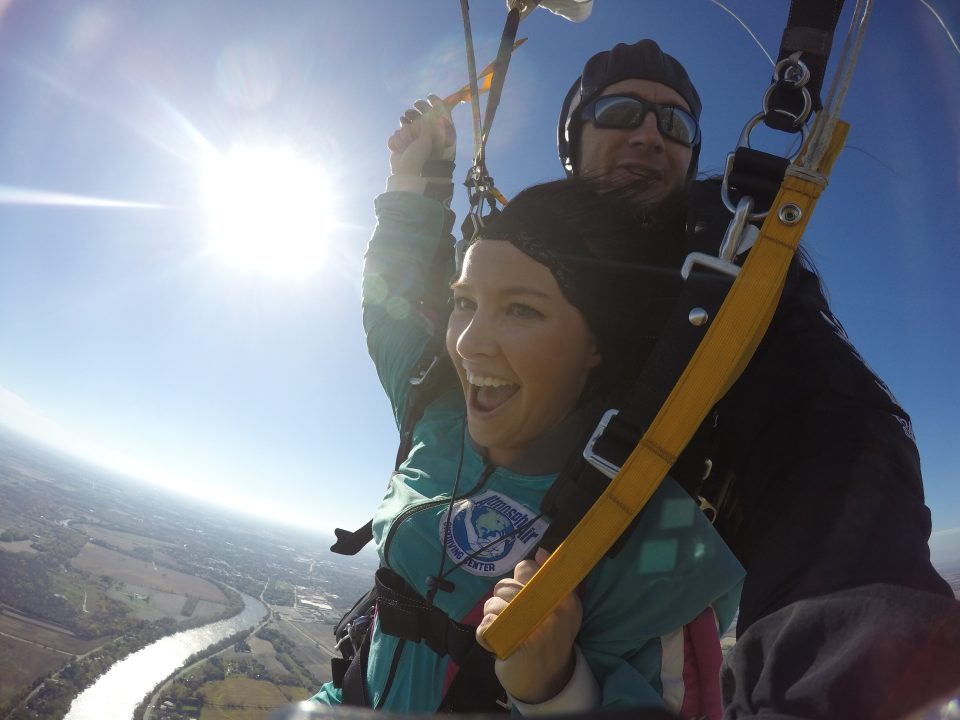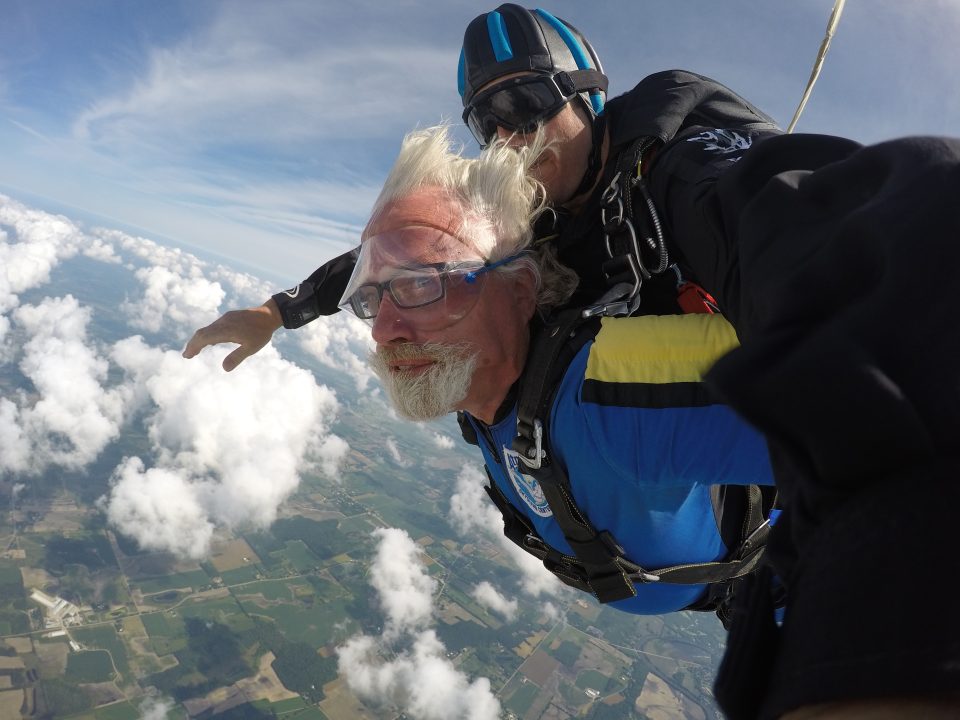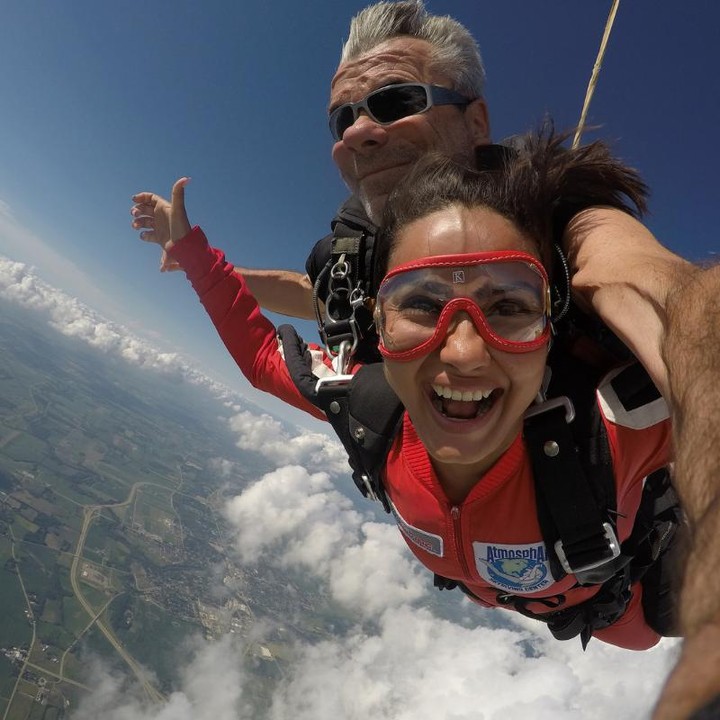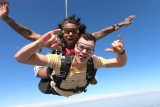Medical Reasons Not To Skydive
Skydiving Safety
Posted by: Wisconsin Skydiving Center 3 years ago
There’s a lot of information out there about who should go skydiving, but equally important to cover is who should not go skydiving. There are several medical reasons not to skydive – some you can make a judgment call for yourself; others require that you talk with your doctor before you make your booking.
The three top medical reasons not to skydive are injuries to the neck and spine, heart-health conditions (including hypertension), and pregnancy. There are other medical concerns to consider as well. Let’s get into it.

Can You Go Skydiving If You Have Neck & Back Issues?
Skydiving with a “bad back” or a previous neck or spine injury is generally not a good idea. You can exacerbate an existing issue, or introduce a new issue with the technique you use to compensate for the existing one.
During a skydive, you have to assume several different positions. When you board the aircraft, you all but crawl to your spot. In freefall at 120 mph, you take a belly-to-earth arched position like a banana. When the parachute is deployed, you decelerate quickly – it’s nothing to worry about for most, but it may be memorable for the wrong reasons if you have neck and back issues. At landing, you must pick up your legs and hold them while your instructor navigates the touch-down (knee and ankle injuries are a consideration here, too). If the idea of any of these descriptions makes you wince, skydiving is probably not for you.
Think your neck or spine are healed up enough to go skydiving? Talk with your doctor to make sure. After all, skydiving is supposed to be fun – not painful!
Can You Go Skydiving If You Have A Heart Condition?
Skydiving is exciting … exhilarating … adrenaline-inducing … heart pounding! All awesome parts of the experience if you have a healthy heart; not so much if you suffer from high blood pressure or another heart health issue.
You should think twice about skydiving if you have had a heart attack, or have a heart murmur or a pacemaker. The force of gravity at parachute deployment can put a pacemaker patient at risk of arrhythmia and can cause the pacemaker to malfunction.
A controlled heart health issue may be no big deal, but it’s your doctor who should make that declaration – not you, and definitely not us. We’re not at all qualified to clear you to jump with a health condition.

Can You Go Skydiving While Pregnant?
No doctor is going to sign off on a pregnant person making a tandem skydive. It’s an inherently risky activity to begin with and a baby on board makes the stakes higher than a doctor (and dropzone owner) is willing to greenlight.
Skydiving while pregnant is not a good idea for a few reasons. For one, your body is flooded with higher-than-normal levels of hormones. Relaxin and progesterone in particular can contribute to loosened ligaments and joints – a good thing for your growing baby, but a potential cause for injury during a skydive. Secondly, the different positions you have to take while jumping, and the g forces you experience while doing them, can be uncomfortable at best and damaging at worst. For tandem skydivers, it’s a no-go.
When it comes to licensed skydivers, though, it’s a bit of a different story. Experienced skydivers know what’s involved in the process and how it feels, the risks associated with the sport, the emergency procedures that may be required, and they know their bodies. A sport skydiver may decide, at their own risk, to jump while pregnant. Every now and then, you’ll see a baby bump boarding the plane, but it’s more common for licensed skydivers to suspend skydiving activities as soon as they know they’re pregnant.
Other Medical Reasons To Consider When Skydiving
With “the big three” covered, let’s do a “lightning round” of other medical questions you may have about skydiving. As we’ve stated several times already (and will again before the conclusion of this article!), talk with your doctor about your specific situation before booking your skydive.

Can You Skydive With Epilepsy Or Seizure Disorder?
Epilepsy and skydiving typically don’t mix. If you’re medicated and your seizures are few and far between, your doctor may clear you to jump. You’re more likely to get sign-off to do a tandem skydive, where your instructor is in control than for a solo jump. In either scenario, please make others aware of your diagnosis and be mindful that a mid-flight seizure may endanger your instructor and others. If you feel an episode coming, ride the plane back down.
Can You Skydive With Diabetes?
If your diabetes is well controlled and you can feel when a blood sugar incident is forthcoming, your medical provider may have no issue with you tandem skydiving or even getting your license. If, however, you are prone to passing out or have a harder time controlling your levels, you’re not likely to get the doc’s endorsement. Diabetics are encouraged to wear a MedicAlert bracelet, tell someone on the dropzone that they’re diabetic, keep snacks and water on hand, and ride the plane back down if in doubt.
Can You Skydive With Asthma?
If your asthma is controlled, skydiving may be no problem for you. Skydiving may not be in the cards if your asthma is severe, difficult to control, or you’re experiencing a flare-up. Those with triggers related to temperature, altitude, and fumes, are not likely to enjoy skydiving. Of course, talk with your doctor before jumping, keep your inhaler close while at the DZ, and inform folks around you if you’re prone to attacks.
Bottom line: if you have a medical concern, (say it with us!) talk with your doctor before booking your skydive. Permission granted? Book your jump and let’s gooooo! Blue skies!



